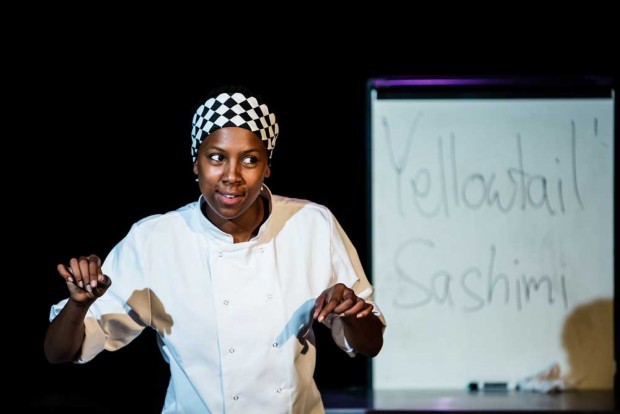You have no items in your cart. Want to get some nice things?
Go shopping
After performing one of the best Hotspurs I’ve ever seen in Henry IV at the Donmar Warehouse, Jade Anouka is back in prison. The first time around was, of course, in Phyllida Lloyd’s prison-set series of all-female Shakespeare plays; this time, it’s in Chef by Litro alumnus Sabrina Mahfouz. The play, at the Soho Theatre, is a fifty-minute solo performance about a professional chef turned prison chef who is discussing her philosophies of food in an apparent attempt to distract herself from a recent trauma in the kitchen, but in doing so is inexorably drawn into relating the traumas of her past.
While Mahfouz constructs a tight, compelling story, with the most startling revelations nudged tantalizingly out of reach without ever feeling heavy-handedly obfuscated, Anouka’s performance is what sets the evening alight. Anouka tackles Mahfouz’s poetic prose confidently. Mahfouz constructs some truly beautiful imagery— the opening discussion of a peach typifies her subtly political metaphors and verse-like use of language— but Chef is most effective when she allows the sharply naturalistic refrains of the central character’s checkered past to intrude and, in so doing, become poetry in their own right. The short play tackles a tangle of questions about privilege, parenthood, legacies of abuse, and the unpalatable options for girls growing up in a violent street culture most frequently discussed for its destruction of the lives of boys; it was this last question I found most original and compelling, and often most beautifully expressed.
The coincidence of the prison settings is not the only reason I mentioned Anouka’s Hotspur: the traits that made that portrayal so heartbreaking and compelling are all in evidence here, and indeed, there is a strange synchronicity between Harry Percy and the unnamed chef. Both are characterized by a charming self-confidence, one that is not smooth and easy, but hard-won armour against a violent upbringing, a shield for innate but easily damaged goodness. And both, with this mass of contradictions and outbursts and palpable effort to make good, are not the types of roles women normally get a chance to play.
Two weeks ago, the newest season of the series Orange is the New Black was released on Netflix. Set in a women’s prison, it has received praise for its depiction of racially, physically, sexually diverse women— in fact, similar praise (though less of the last) to that received by Phyllida Lloyd’s all-female Shakespeare. Both Lloyd and Orange is the New Black creator Jenji Kohan have been explicit in interviews about using their settings to combat their own frustration with the opportunities for women on stage and screen, respectively. The prison environment provides a means of radically rejecting the heterosexual romances that dominate women’s storylines in popular media, and permitting women to inhabit the questions of life or death, keeping or selling your soul that the male leads get to grapple with daily.
Yet Mahfouz’s play places these universal issues in an inescapably feminine frame. The pressures placed on Anouka’s character, the ones that lead her to commit the dual crimes the play gradually builds to uncovering, are specifically female expectations, particularly the overwhelming social pressure to selflessly love and be loved (especially by men), to find a place in a readily recognizable version of a nuclear family.
Solo performance has long been associated with marginalized voices, particularly autobiographical one-person shows. Mahfouz has written and Anouka presents a fictionalized story (inspired by real interviews that Mahfouz conducted), but the genre’s unabashed demand that attention must be paid— even if just for an hour— becomes itself an essential thematic aspect of the piece. Anouka’s character is not a person who is used to being listened to. Indeed, the play itself depicts several important exchanges in which she is pointedly ignored. But even if their character doesn’t, Mahfouz knows what she wants to say, and Anouka knows how to hold an audience captive to listen.
Chef continues at the Soho Theatre until July 4.





